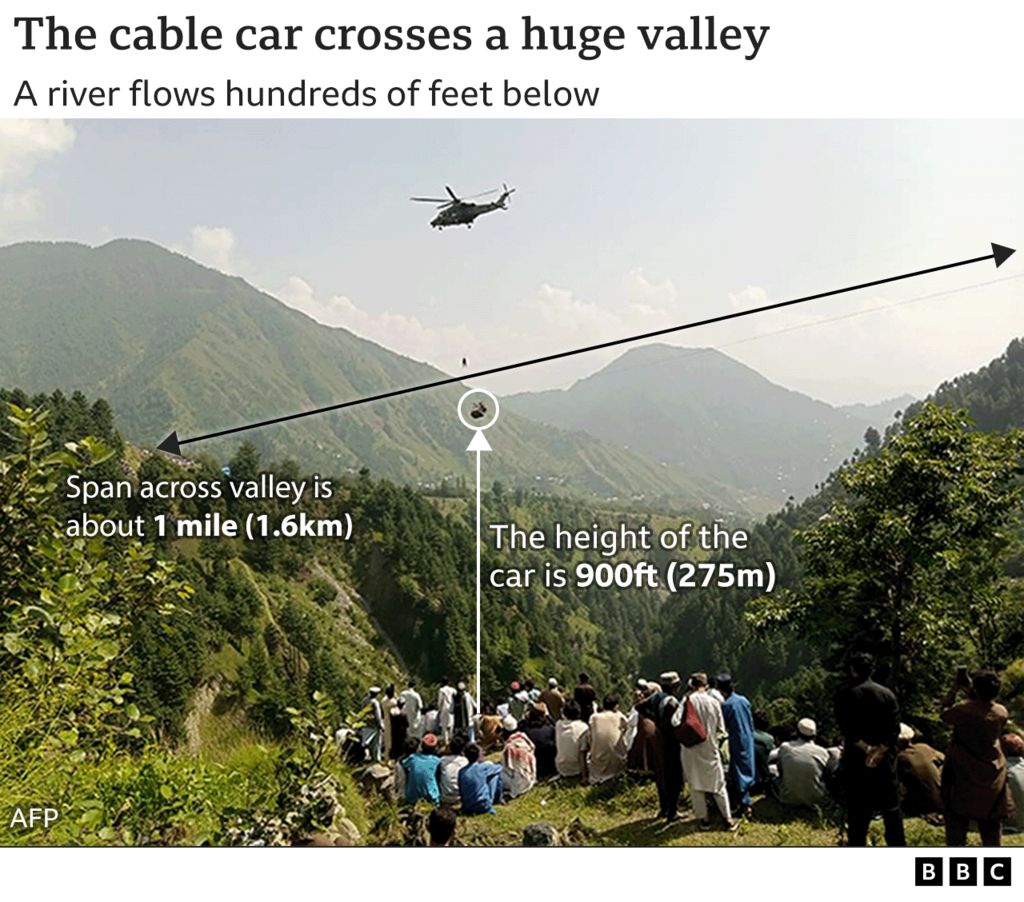Owner of Pakistan cable car arrested by police on negligence charges
Police in Pakistan have arrested the owner of a cable car that left eight people stranded and dangling over a ravine when it malfunctioned.
The incident in Khyber Pakhtunkhwa sparked a massive rescue operation lasting more than 12 hours.
Officers detained Gul Zareen on multiple charges, including endangering valuable lives and negligence.
The arrest comes after a child who was trapped in the chair-lift said he feared “it was over” during the ordeal.
“When the chairlift was halfway there, its rope broke. It was dangling and I was terrified,” Attaullah Shah said.
A military chopper rescued one trapped child, while zip line experts recovered the rest of the group after dark.
The group had been on their way to school when two of the car’s cables snapped.
It was left hanging precariously 274m (900ft) above the ground and in high winds.
“It was like doomsday for the area,” said Fahim Udin Shah, the uncle of one of the rescued children.
“Everyone rushed out of their homes [to observe the operation]. A kid from almost every household was here,” he added.
Pakistan’s army said the rescue mission had been “extremely difficult and dangerous”.
The incident happened at about 07:00 local time (02:00 GMT) on Tuesday near the city of Battagram in Khyber Pakhtunkhwa province.
Six children, aged between 10 and 16 years old, were trapped, along with two adults.
One of the children, a teenage boy, has a heart condition and was unconscious for several hours, an adult on board named Gulfaraz told local media.
A child also fainted due to “heat and fear”, a rescue worker told Reuters news agency, although it was unclear if that was the same child.
The cable car links the village of Jangri to Batangi, where the school is located.
The cable car is a popular and cheap mode of transport to get across the Allai valley – cutting a two-hour road journey through mountainous terrain to just four minutes.
When the cable suddenly snapped, the car was making its fifth trip of the day.
Residents used loudspeakers to alert officials to the crisis, but it took at least four hours for the first rescue helicopter to arrive at the remote location, local media outlet Dawn reported.
Anxious crowds, including relatives of those trapped, quickly gathered along the ravine, watching on as military helicopters battled against the strong winds to lower commandos to the stranded car.
Several early attempts to reach them failed, however some food and water was successfully delivered.

In addition to gusty winds, there were concerns that the helicopter’s rotor blades could further destabilise the cable car, and as night set in the operation was suspended.
But rescuers continued their efforts with the help of zip line experts and local people on the ground.
Allai is a mountainous area, located at an altitude of 2000m above sea level. Settlements are spread far and wide and there is little infrastructure like roads and basic facilities.
In most of the area, makeshift chairlifts and cable cars are used regularly for transportation from one mountain to another.
The one involved in this incident is believed to be privately operated by residents, local media reported.
It remains unclear how the cables on the stranded cable car broke, but this mishap has drawn scrutiny to the makeshift cable car system widely used in Pakistan.
In most of the country’s mountainous regions, makeshift chairlifts and cable cars are used regularly for transportation from one mountain to another.
For instance, in the Allai valley where Tuesday’s incident occurred, settlements are spread far and wide and located up to 2000m above sea level. There is little infrastructure like roads and basic facilities.
Pakistan’s acting prime minister Anwaar ul Haq Kakar has ordered all privately-operated chair-lifts to be inspected for safety.



